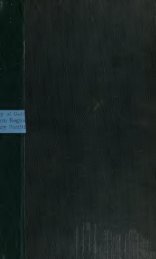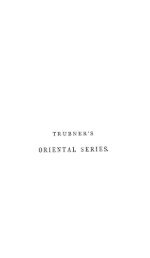Untitled
Untitled
Untitled
You also want an ePaper? Increase the reach of your titles
YUMPU automatically turns print PDFs into web optimized ePapers that Google loves.
*<br />
I $8<br />
<<br />
I<br />
4<br />
(<br />
N6TES ON THE FOURTH DISCOURSE<br />
al-Jiizjam was thenceforth constantly with him until his death in 428/1037,<br />
always t urginghim to record his knowledge in books while he lived, and<br />
preserving these writings from destruction after his tfeath. For Avicenfia;.<br />
'<br />
at recorded in the Chahdr Maqdla (p. 92 supra), distracted by the rival<br />
claims of learning, pleasure and statecraft, enjoyed little leisure and<br />
tranquillity, ai\d when he wrote a book wouM* often giVe the original to<br />
the ^)rson who had asked him to write' it without keeping a copy for<br />
himself. After his death al-Jdzjani sought out these scattered writings ,<br />
wherever they could be found and arranged and edited them, while 1<br />
in<br />
other cases he actually assisted in their composition. Thus the Ddnishndma-t-'A/d't<br />
1<br />
Avicenna's ,<br />
1 most important Persian work, composed Vor<br />
and dedicated to 'Ala'u'd-Dawla Abd Ja'far KakUya, was designed to<br />
treat of Logic, Metaphysics, Natural Science, Mathematics, Astronomy,<br />
Music and Arithmetic; but after his death only the first* three sections<br />
could be found. The missing portions were therefore compiled and<br />
translated by al-Juzjani from the Shifd and other Arabic works of his<br />
master, and the lacuna thus filled. We also owe to al-Jiizjani' the continuation<br />
of Avice/ma's autobiography from the time of their first<br />
meeting in Jurjan down to his death. The full text of this is given l?y<br />
2 3<br />
Ibn Abi Usaybi'a and an abridgement of it .<br />
by al-Qifti<br />
'<br />
1 1 . Sayyid Isma // Ju rjdni.<br />
This is probably the first Muslim physician who used the Persian<br />
language chiefly or exclusively in writing on scientific subjects, or at<br />
least the first whose works have come down to us. He gives his<br />
^name<br />
and genealogy as follcvws in the Introduction to his Dhak'/itr'a-i-<br />
Khwdrazmshdhi* : Isma'il ibnu'l- Hasan ibn Muhammad ibn Ahmad<br />
al-Husayni al-Jurjani. Fonahn 8<br />
gives his father's name as Ahmad<br />
instead of al-Hasan, his laqab as Zaynu'd-Din, and his kunya as Abii<br />
Ibrahim: while Rieu 6<br />
transposes Muhammad and Ahmad in his pedigrAe;<br />
and Leclerc 7 calls him Abu'l-Fada'il and Sharafu'd-Din. Little is<br />
known of his life except that he came to Khwarazm (Khiva) and<br />
entered the service of Qutbu'd-Din Muhammad Khwarazmshah in<br />
504/1110-1111, composed the four medical works (Aghrdd, Dhakhira,<br />
Khuffi and Yddgdr) mentioned in the Chahdr Mgqdla, and died- at<br />
Ivierv in or about the year 531/1136-7.<br />
The contents of the Aghrddu't-Tibb*("Avn:s of Me*dicine"), composed<br />
for the Minister of Atsiz Khwarazmshah (reigned A.D. 1127-1156), and<br />
the manuscripts of it existing in different libraries are fully described by<br />
Fonahn 8<br />
, as are the Khuffi-i-'Aid i* (composed in A.D. 1113) and the^<br />
Yddgdr-i-Tibb ("Medical Memoranda") 10<br />
, which deals 'with Pharmaco-'<br />
1 As already noted, the text was lithographed in India in 1309/1891-2, but is<br />
rare. Mr A. G. Ellis most kindly placed his copy at my disposal.<br />
Mirza Muhammad<br />
mentions two MSS. in the British Museum, -viz. Add. 16,830 and Add. 16,659,<br />
b b<br />
ff. 258 ~342 , and there is another, Or. 16,830. See Rieu's Pers. Cat., pp. 433-434.<br />
-<br />
Tabaqdtu'l-Atibbd, ii, 3<br />
pp. 4-9<br />
Pp. 417-426 of edition.<br />
Lippert's<br />
* in an old thirteenth century MS. of Books I-III of this work in my possession.<br />
5 Zur








![La religione di Zarathustra nella storia religiosa dell' Iran [microform]..](https://img.yumpu.com/15970820/1/151x260/la-religione-di-zarathustra-nella-storia-religiosa-dell-iran-microform.jpg?quality=85)


